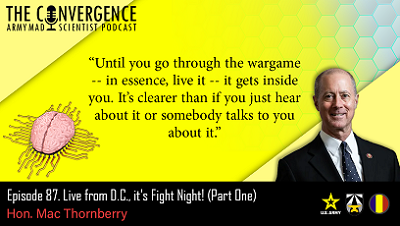“Until you go through the wargame — in essence, live it — it gets inside you. It’s clearer than if you just hear about it or somebody talks to you about it.”
[Editor’s Note: Regular consumers of Army Mad Scientist content — via this blog site and The Convergence podcast — understand how wargaming can enhance Professional Military Education (PME), hone cognitive warfighting skills, and broaden our understanding of the Operational Environment. Wargaming removes hierarchies and encourages players to attempt innovative solutions, while also creating a safe environment in which to fail repeatedly and learn from mistakes. Wargaming can also help us assess concepts and capabilities with a reasonable degree of verisimilitude — before committing the Nation to costly, and in some instances, irrevocable courses of action.
In our latest episode of The Convergence podcast, we report back from “Fight Night” in Washington, D.C. , where we sat down with the Hon. William M. (“Mac”) Thornberry, former U.S. Representative for Texas’ 13th Congressional District and former Chairman of the House Armed Services Committee, to discuss the importance of wargaming to public policy, his experiences with it on Capitol Hill, and what we can do to better emphasize it with our lawmakers — Enjoy!]
[If the podcast dashboard is not rendering correctly for you, please click here to listen to the podcast.]
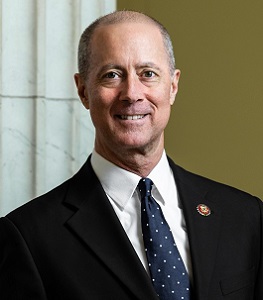 The Almanac of American Politics 2020 called William M. (“Mac”) Thornberry “one of Congress’ brainiest and most thoughtful members on national and domestic security issues,” and said that he “has long been at the forefront of national security issues.” USA Today said Mac has “experience in Washington, a rare long view and a reputation for serious, thoughtful problem-solving.” Since leaving Congress after 26 years, which included service as Chairman of the House Armed Services Committee, Mac continues to work at the intersection of technology and national security. He serves various companies and non-profit organizations as a board member and advisor.
The Almanac of American Politics 2020 called William M. (“Mac”) Thornberry “one of Congress’ brainiest and most thoughtful members on national and domestic security issues,” and said that he “has long been at the forefront of national security issues.” USA Today said Mac has “experience in Washington, a rare long view and a reputation for serious, thoughtful problem-solving.” Since leaving Congress after 26 years, which included service as Chairman of the House Armed Services Committee, Mac continues to work at the intersection of technology and national security. He serves various companies and non-profit organizations as a board member and advisor.
Consistently on the leading edge of critical national security issues during his time in Congress, Mac led in creating the National Nuclear Security Administration to improve management of the nation’s nuclear weapons complex; establishing the Department of Homeland Security (introducing a bill to do so six months before the attacks of 9/11); preparing the military to defend the nation in new domains of warfare such as space and cyber; and improving DOD’s innovation and acquisition efforts.
In addition to serving on the House Armed Services Committee throughout his time in Congress, Mac also served on the House Intelligence Committee for 14 years. He has written widely on defense matters and appeared on all major television channels providing insight on national security-related issues.
In December 2021, Mac received the Peace Through Strength Award from the Ronald Reagan Presidential Foundation and Institute. He is also the recipient of the Distinguished Service Medals from the Army, the Navy, and the Air Force, as well as the Marine Corps Foundation’s Semper Fidelis Award, the American Legion’s Distinguished Public Service Award, the Sam Nunn National Security Leadership Award from the Center for Strategic and International Studies, and awards from the Aerospace Industries Association, Military Officers Association, National Defense Industrial Association, Non Commissioned Officer Association, Computing Technology Industry Association, USO-Metro among others. During the fall 2021 semester, he was a Resident Fellow at the Institute of Politics in Harvard’s Kennedy School and has been named a Distinguished Alumnus of Texas Tech University.
Born in Clarendon, Texas and raised on the family ranch in Donley County, Mac is a graduate of Clarendon High School, Texas Tech University, and the University of Texas Law School. After law school he worked in Washington on Capitol Hill and as Deputy Assistant Secretary for Legislative Affairs in the State Department under President Reagan. In 1989, Mac joined his brothers in the cattle business and practiced law in Amarillo until his election to Congress.
Army Mad Scientist caught up with Mac at “Fight Night” in Washington, D.C., on 23 September 2023, where he headlined the event. We spoke with him about the importance of wargaming to public policy, his experiences with it on the Hill, and what we can do to better emphasize it with our lawmakers. The following bullet points highlight key insights from our conversation:
-
-
- National security issues today are more complex than ever. Developing the intellectual capital of our military and
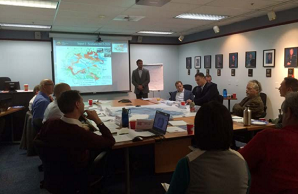 congressional leaders by exploring scenarios and decision-making through wargaming is becoming even more crucial.
congressional leaders by exploring scenarios and decision-making through wargaming is becoming even more crucial.
- National security issues today are more complex than ever. Developing the intellectual capital of our military and
-
-
-
- Wargaming provides political leaders with a deeper understanding of dealing with large, complex problems and the practical support required for military operations, making it a
 very important and useful tool for Congress. Consequences of decision-making are clearer and more impactful when played out in a game.
very important and useful tool for Congress. Consequences of decision-making are clearer and more impactful when played out in a game.
- Wargaming provides political leaders with a deeper understanding of dealing with large, complex problems and the practical support required for military operations, making it a
-
-
-
- A positive, working relationship between congressional and military leaders is necessary at the strategic level,
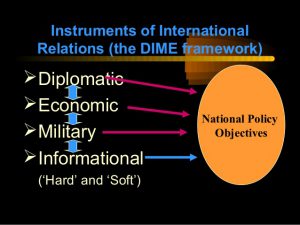 as conflicts are no longer isolated to the military. Conflicts will have implications for all Government departments, from the Department of Homeland Security to the State Department.
as conflicts are no longer isolated to the military. Conflicts will have implications for all Government departments, from the Department of Homeland Security to the State Department.
- A positive, working relationship between congressional and military leaders is necessary at the strategic level,
-
-
-
- Wargaming is especially significant for planning and readiness, allowing players to explore different scenarios to determine whether execution of a particular
 plan is possible given current readiness. This has large implications for resource decision-making, as Congress must provide and maintain for the military.
plan is possible given current readiness. This has large implications for resource decision-making, as Congress must provide and maintain for the military.
- Wargaming is especially significant for planning and readiness, allowing players to explore different scenarios to determine whether execution of a particular
-
-
-
- Joint wargames between congressional and military leadership provide both parties an opportunity to make decisions side-by-side while experiencing how the
 other thinks and operates. Games conducted with joint participation allow both to simultaneously understand, anticipate, and execute planning and operations, learning in a safe, controlled, and iterative environment.
other thinks and operates. Games conducted with joint participation allow both to simultaneously understand, anticipate, and execute planning and operations, learning in a safe, controlled, and iterative environment.
- Joint wargames between congressional and military leadership provide both parties an opportunity to make decisions side-by-side while experiencing how the
-
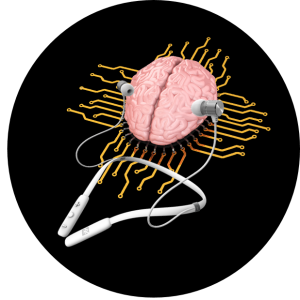
Stay tuned to the Mad Scientist Laboratory for our next episode of The Convergence podcast on 09 November 2023, when we report back from “Fight Night” (Part Two) with the designers, coordinators, and participants and their insights on the importance of wargaming!
If you enjoyed this post, check out the following related content:
Would You Like to Play a Game? Wargaming as a Learning Experience and Key Assumptions Check and “No Option is Excluded” — Using Wargaming to Envision a Chinese Assault on Taiwan, by Ian Sullivan
Using Wargames to Reconceptualize Military Power, by proclaimed Mad Scientist Caroline Duckworth
Gaming the System: How Wargames Shape our Future and associated podcast, with guest panelists Ian Sullivan, Mitchell Land, LTC Peter Soendergaard, Jennifer McArdle, Becca Wasser, Dr. Stacie Pettyjohn, Sebastian Bae, Dan Mahoney, and Jeff Hodges
A New American Way of Training and associated podcast, with Jennifer McArdle
From Legos to Modular Simulation Architectures: Enabling the Power of Future (War) Play, by Jennifer McArdle and Caitlin Dohrman
The Storm After the Flood virtual wargame scenario, video, notes, and Lessons Learned presentation and video, presented by proclaimed Mad Scientists Dr. Gary Ackerman and Doug Clifford, The Center for Advanced Red Teaming, University at Albany, SUNY
The Metaverse: Blurring Reality and Digital Lives with Cathy Hackl and associated podcast
Gamers Building the Future Force and associated podcast
Fight Club Prepares Lt Col Maddie Novák for Cross-Dimension Manoeuvre, by now COL Arnel David, U.S. Army, and Major Aaron Moore, British Army, along with their interview in The Convergence: UK Fight Club – Gaming the Future Army and associated podcast
Disclaimer: The views expressed in this blog post do not necessarily reflect those of the U.S. Department of Defense, Department of the Army, Army Futures Command (AFC), or Training and Doctrine Command (TRADOC).

